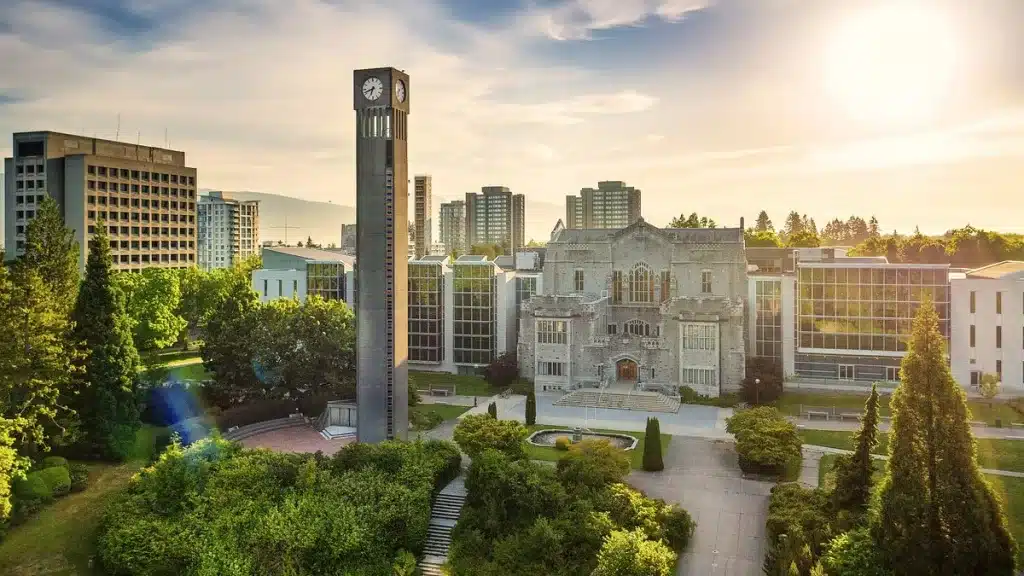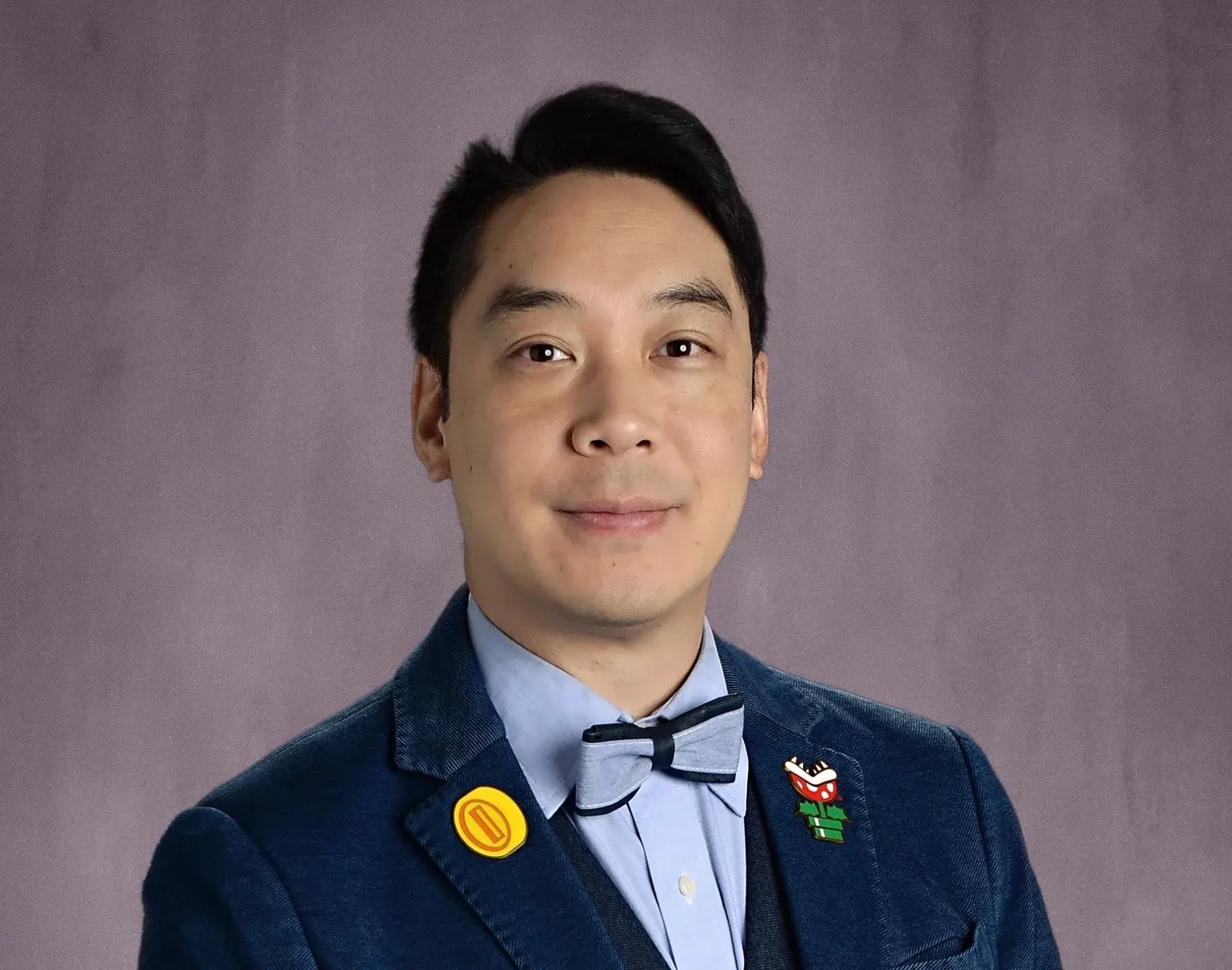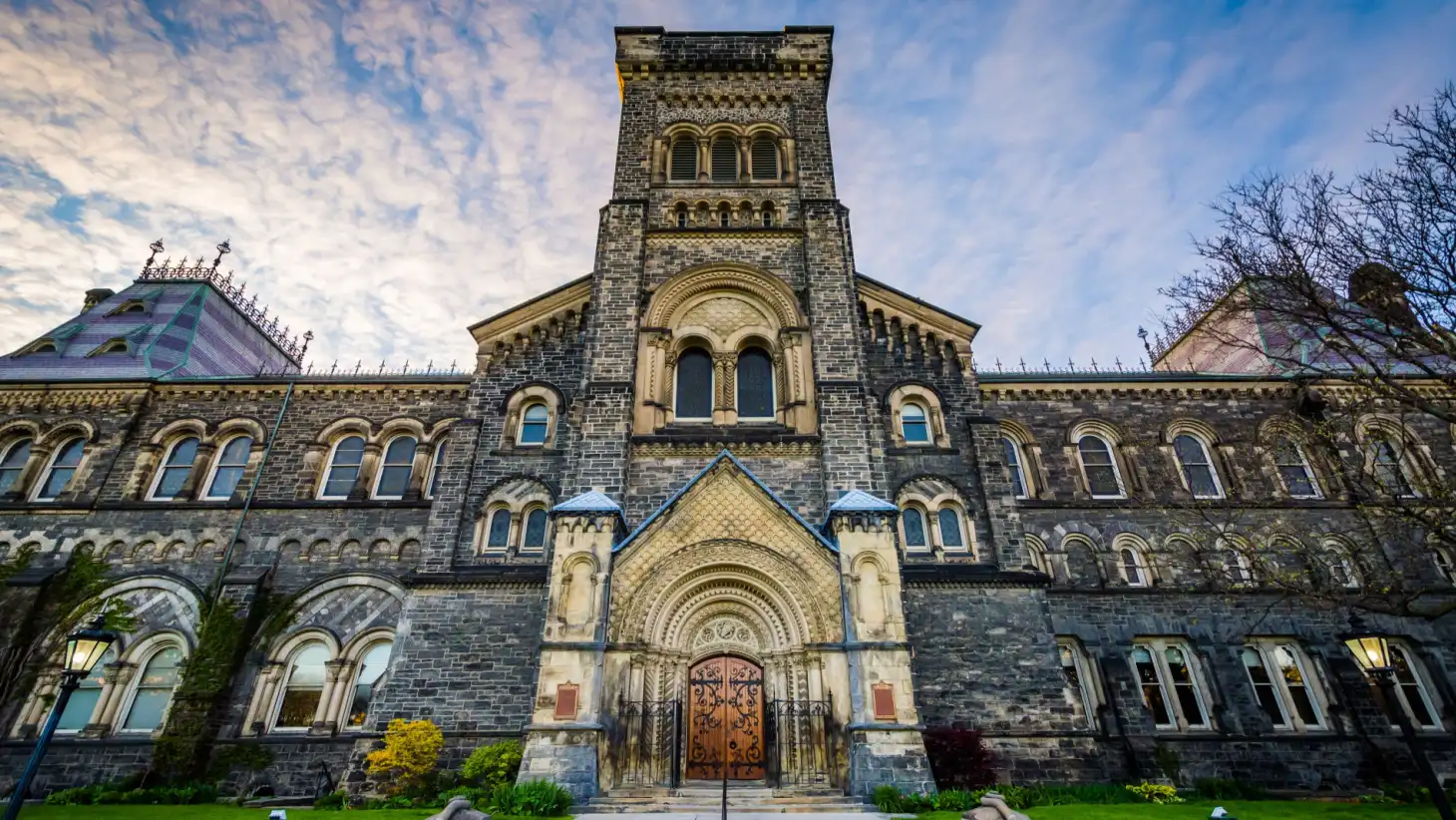
The University of British Columbia (UBC) is one of Canada’s top-ranked universities, known for its world-class academics, vibrant student life, and stunning campuses in Vancouver and the Okanagan. With a broad-based admissions process, UBC evaluates students based on grades, required courses, and the Personal Profile, which highlights extracurriculars and leadership experiences. Whether you're aiming for UBC Vancouver or UBC Okanagan, this guide covers everything you need to know about undergraduate admission requirements, the application process, and tips to strengthen your application.
Key Takeaways
- Admission is Competitive but Holistic – UBC considers grades, program prerequisites, and a Personal Profile that showcases your leadership, extracurriculars, and personal growth. Competitive programs (e.g., Engineering, Commerce, Computer Science) require high 80s to low 90s averages.
- Application Deadlines Matter – Apply by December 1 for early scholarship consideration and January 15 for the final deadline. Certain programs, like Architecture and Music, may have additional portfolio or audition requirements.
- Scholarships & Financial Aid Available – UBC offers merit-based entrance awards (Presidential Scholars, IMES for internationals), need-based bursaries, and Work-Learn jobs to help students finance their education. High-achieving students and those with financial need should apply early for the best opportunities.
1. Undergraduate Admission Requirements

General Requirements (Domestic vs. International): All applicants must be on track to graduate from high school and satisfy UBC’s English Language Admission Standard. Canadian students need to meet provincial graduation requirements (e.g. BC Dogwood Diploma) and international students must have equivalent credentials (UBC provides country-specific requirements). In general, you need a strong overall academic average (typically B range or higher) – the absolute minimum to be considered is around 67-70%, but competitive programs require much higher. International applicants whose first language is not English must demonstrate proficiency via IELTS/TOEFL or other accepted means. UBC also requires all high school applicants to submit a Personal Profile as part of a broad-based admissions process (more on this below).
Program-Specific Requirements: In addition to general requirements, you must meet degree-specific course prerequisites for the program you apply to. UBC will check that you’ve completed certain Grade 11/12 courses relevant to your chosen field. For example, applying to Science or Engineering means you need Grade 12-level math and sciences, whereas Arts or Commerce applicants need strong preparation in English and math. Some specialized programs may require supplemental steps – Bachelor of Design (Architecture) applicants submit a portfolio instead of the standard Personal Profile, and Music applicants audition as part of the selection process. The table below compares a few UBC programs and their typical admission standards:
| Program (Degree) | Key High School Requirements | Grade Range and Admission Factors |
|---|---|---|
| Bachelor of Arts (BA) | English 12; pre-calculus 11 or Found. Math 12 (min. requirement); a second language 11; Social Studies 11; (Pre-calculus 12 recommended for Econ majors) | Broad-based admission with Personal Profile. Competitive average typically mid-80s. |
| Bachelor of Science (BSc) | English 12; Pre-calculus 12; one of Biology 12, Chemistry 12, or Physics 12; plus Chemistry 11 and Physics 11 | Personal Profile required. High 80s average or higher is competitive. Strong math/science grades expected. |
| Bachelor of Applied Science (Engineering) | English 12; Pre-calculus 12; Chemistry 12; Physics 12; a Language 11. (Math/Science 11/12 across the board recommended) | Personal Profile required. Very competitive – high 80s to low 90s average. Some applicants missing one of Chem/Phys 12 may be considered case-by-case. |
| Bachelor of Commerce (BCom) | English 12; Pre-calculus 12; a Language 11; an approved Science 11. (Calculus 12 is not required but strengthens your preparation) | Personal Profile required (Sauder School looks at leadership, entrepreneurship potential). Competitive average in high 80s. |
| Bachelor of Fine Arts (BFA) or Design (BDes) | English 12; for BDes: an approved art/design portfolio (no Personal Profile); for BFA Visual Arts: Art coursework is expected. | BDes in Architecture requires a portfolio and short essays instead of Profile. BFA may require portfolio or audition (for Theatre/Music). Academic average requirements vary (mid-70s+), but talent evaluation is crucial. |
Note: The above are examples – each UBC degree has specific prerequisites. Always check UBC’s official program requirements for the campus and faculty you’re applying to. For instance, Nursing requires Biology 12 and Chemistry 12, Education programs may require volunteer experience, etc. Meeting the minimum courses does not guarantee admission; the stronger your grades, the better your chances, especially for competitive programs.
2. Application Process & Deadlines
How to Apply (Step-by-Step):
- Research Your Program Options: Explore UBC’s campuses (Vancouver or Okanagan) and decide which degree(s) you will apply to. On the application you can select a first and second choice program – for example, BSc at Vancouver as first choice and BSc at Okanagan as second choice. Make sure you meet the specific requirements for both choices.
- Prepare Required Documents: During fall of your Grade 12 (or final pre-university year), gather your transcripts and proof of English proficiency (if needed). You don’t need to send them with the initial application, but you will upload/submit transcripts later via UBC’s portal. If you are an Ontario high school student, you’ll provide your OUAC number so UBC can retrieve your grades electronically. International students should also have passports and other academic records ready.
- Start the Online Application: UBC’s application opens in early October each year for the next September intake. Create your account on UBC’s application portal (or use EducationPlannerBC if applicable) and fill in your personal information, academic history, and program choices. Tip: Apply well before the final deadline to avoid last-minute issues and to be eligible for scholarships/early offers.
- Write the Personal Profile: All high school applicants must complete UBC’s Personal Profile section in the application (a set of short essay questions) about your experiences, achievements, and goals. Take your time to craft thoughtful responses – you can save and return to the application before submitting. (See Tips in section 3 below on how to make your profile stand out.)
- Pay the Application Fee and Submit: When your application is complete, pay the required fee (approximately CAD $75 for Canadians or $125 for international applicants, depending on program) and submit your application by the deadline. Certain specialized programs may have an additional supplemental fee or interview (e.g. the Sciences Po dual degree requires a video interview), but for most undergraduate programs the online form and profile are sufficient.
- Upload Required Documents: After applying, you’ll get instructions on submitting your official transcripts and any other documents. UBC may request interim transcripts by January for early applicants, and final transcripts in the spring. Domestic students in BC can have their school send grades directly, while others may need to upload PDF scans of report cards or have their school counsellor submit grades through a portal. English test scores (if required) or other items must be submitted by the stated deadlines (usually by January or February). Keep an eye on your UBC applicant account for a personalized checklist.
- Track Your Application: UBC reviews applications from January through April on a rolling basis – this is not first-come, first-served; every application submitted by the deadline gets full consideration. You may receive an offer as early as late January if you applied by the early deadline and have very strong grades, or you may hear a decision in March/April once all profiles and grades are evaluated. Admission decisions will appear on your portal (and you’ll get an email). In the meantime, you can apply for housing and submit scholarship applications (if you haven’t already).
- After Admission: If you receive an offer, congratulations! Follow the steps in the offer package: usually you must accept your offer and pay a deposit by May 1 to secure your seat. You’ll also want to apply for a study permit (international students)and finalize housing, course registration, etc., in the summer. If you’re not admitted to your first-choice program, UBC will automatically consider your second choice (so having a backup program can increase your chances of getting into UBC).
Key Deadlines
UBC’s application cycle has several important deadlines for applying, document submission, and scholarships. Below are some key dates for a typical fall (September) intake:
October 1
Application Opens for the following year’s intake (e.g. applications for Fall 2025 open in early October 2024). Begin your online application as soon as possible.
November 15
Deadline for International Scholars Award Application. If you are an international student seeking need-based scholarships (the International Scholars Program, which includes awards like the Karen McKellin International Leader of Tomorrow Award), you must submit a separate scholarship application by Nov 15 and apply for admission by Dec 1. (This requires a nomination from your school – a highly competitive full-ride award.)
December 1
Early Application Deadline for Major Entrance Scholarships and Early Offers. Apply by Dec 1 if you want to be considered for UBC’s major merit scholarships or a possible first-round offer of admission.
For Canadian students (Domestic): You must apply by Dec 1 to be automatically considered for UBC’s Presidential Scholars Awards and Centennial Entrance Awards. No separate form is needed, but you do need to have the application in by this date.
For International students: Apply by Dec 1 to be considered for an early offer. (International applicants are also automatically considered for merit awards, but their major entrance awards – IMES/OIS – don’t require a separate early application, just the regular Jan 15 deadline; see Section 5).
January 15
Final Application Deadline for Fall admission. All students (domestic and international) must submit the UBC application by Jan 15 (11:59pm PST). This is the absolute latest – if you miss this, you’ll have to wait another year. Make sure your online application and Personal Profile are submitted by this date.
Late January – February
Document Deadlines. After applying, you’ll be asked to submit supporting documents. For example, English Language proficiency test results (if required) must be submitted by Feb 15. Many Canadian students’ grades are fetched automatically, but if UBC requests you to upload an interim transcript, typically you should do so by late January or early February. International high school students generally must submit required documents (transcripts, predicted grades, etc.) by March 15. Always check the specific deadlines in your UBC Student Account’s checklist, as they can vary by applicant.
January – April: Admissions Review Period
The Admissions Office evaluates applications from late January through April, and offers of admission roll out continually during this time. Don’t panic if you don’t hear back immediately – most decisions for high school applicants come in March.
March/April: Scholarship Notifications
If you applied by the deadlines, UBC will notify winners of major entrance scholarships around mid-March to April (often by April 15). These notifications may come separate from your admission offer.
May 1: Deadline to Accept Offer (and Housing Application)
Admitted students usually must accept their offer and pay the admission deposit by May 1 (for offers made in winter/spring). This is also the typical deadline to apply for on-campus housing for a guaranteed spot. After May 1, waitlist offers may be given out if spaces open up.
July: Final Transcripts Due
Admitted students need to submit final official transcripts by the end of high school (usually by mid-July) to confirm that you’ve met the conditions of admission (e.g. graduated and maintained your grades).
Tip: Mark these dates on your calendar and don’t miss the scholarship-related deadlines in Nov/Dec. UBC’s major entrance awards require early application, so even though Jan 15 is the final deadline, submitting by Dec 1 has big advantages. Also, give your teachers or counsellors advance notice if they need to send documents (like predicted grades or references for certain awards).

3. Tips for Strengthening Your Application
Crafting a Strong Personal Profile
UBC’s Personal Profile can often make or break your admission, especially if your grades are borderline. It’s essentially a set of short essay questions asking about your experiences, accomplishments, and challenges. The key to a great profile is reflection and authenticity. UBC advisors recommend that you:
(1) Take time to reflect on your experiences and explain what you learned or how you grew from them, rather than just listing achievements;
(2) Be specific and give details – for instance, don’t just say “I volunteered”; describe an incident or project and the impact it had; and
(3) Write in your own voice, honestly and humbly – UBC wants to hear your story, so don’t try to tell them what you think they want to hear. Before submitting, have someone you trust (a teacher or mentor) review your responses for clarity and grammar, but ensure the voice remains yours. Keep within the word limits (each answer will cut off if you go over the character count)
A strong personal profile will highlight qualities like leadership, resilience, curiosity, and community engagement – essentially, it should show who you are beyond your grades.
Need help with writing your personal statement? Learn from admissions consultant Kevin Ly
Showcase Leadership & Extracurricular Involvement
UBC uses broad-based admissions, meaning they look at “the whole person,” not just academics. In your application and profile, emphasize your extracurricular activities, volunteer work, part-time jobs, and leadership roles. There is no specific list of “required” activities – it’s not about doing a hundred things, but rather demonstrating commitment and impact in the things that matter to you. Whether you captained a sports team, took care of siblings, led a club, participated in science fairs, or volunteered at a food bank, share those experiences and what skills or insights you gained. UBC is interested in students who are engaged and have shown initiative or leadership in some form. For example, if you started a small business in high school or organized a community event, that’s worth mentioning. If you’ve won any awards or distinctions (academic or otherwise), be sure to include them in the application. Remember, the Personal Profile questions will give you space to discuss challenges overcome or significant achievements – use that to highlight how you’ve grown. Strategy: When writing, use a STAR approach (Situation, Task, Action, Result) to structure brief stories that showcase your strengths. Quantify impact if you can (“raised $500 for charity”, “mentored 5 younger students”, etc.), and connect your experiences to qualities like perseverance, teamwork, or cultural awareness.
Academic Tips: While UBC looks beyond grades, academics still carry the most weight. To strengthen your chances:
- Aim for the highest grades possible in courses related to your intended program (and decent grades in everything else). UBC will focus on Grade 11 and 12 marks, and they even exclude your lowest Grade 11/12 mark if it’s not relevant to your program. This means improving, say, a weak Grade 11 math grade with a stronger Grade 12 math result can help.
- Take challenging courses if available – e.g. International Baccalaureate (IB) or Advanced Placement (AP) classes. UBC awards bonus points in the evaluation for IB Diploma completion and considers AP/IB in admissions. Doing well in these shows you can handle university-level work.
- Meet the prerequisites early. If a program requires a certain Grade 12 course, try to have it (or its Grade 11 equivalent) completed by first term of Grade 12. Some competitive programs (like Engineering) strongly prefer seeing final grades in required courses by the main application deadline.
- English proficiency: If you need to take TOEFL/IELTS, aim to meet UBC’s required scores well in advance. An English proficiency waiver is possible if you’ve studied 4+ years in English (or certain tests like SAT/ACT), but check UBC’s policy.
- Consult UBC’s Admissions Blog: UBC’s admissions officers regularly post tips (for example, how to choose Grade 11/12 courses, how they evaluate the personal profiles, etc.). This can give you insight into what they value
Overall: Present yourself as a well-rounded individual who will contribute to the campus community. UBC values academic excellence and “achievements beyond academics.” A combination of solid grades and a compelling personal profile that shows passion, leadership, and resilience will maximize your admission chances. Start early – don’t rush your application at the last minute. And if you have a specific question, you can reach out to UBC’s admissions advisors for guidance.
4. UBC Vancouver vs. UBC Okanagan

Admission Competitiveness
Vancouver campus programs tend to have higher admission averages due to larger applicant pools. In recent years, the average entering grade at UBC Vancouver was around 90%, whereas at UBC Okanagan it was about 84%. This doesn’t mean Okanagan has low standards – rather, Vancouver attracts more applicants for the same number of spots, raising the competitive bar. The admission criteria (required courses) are equally rigorous on both campuses for the same programs, but if your grades are a bit lower, you might have a better chance at Okanagan in a comparable program. Both campuses use broad-based admissions (including the personal profile), so holistic factors are considered everywhere. In summary, Vancouver = more competitive intake, Okanagan = slightly more accessible in some programs. (The degree you earn will be a UBC degree from that campus, and both are highly respected.)
Program Offerings
UBC Vancouver is the larger campus and offers a wider array of faculties and specialized degrees. For example, Vancouver has 14 engineering specializations (including unique ones like Biomedical and Mining) while Okanagan offers 4 engineering programs (Civil, Mechanical, Electrical, Manufacturing). Vancouver has the Sauder School of Business (Bachelor of Commerce) and programs like Pharmacy, Architecture, Law (postgrad) and a wider variety of Arts/Science majors. Okanagan, being smaller, still covers a broad range: Arts, Sciences, Engineering, Management (business), Fine Arts, Nursing, Education, etc., but perhaps with fewer niche specializations. For instance, Okanagan’s business degree is a Bachelors of Management, while Vancouver’s is BCom – different programs but similar foundational field. Some unique programs: UBC Vancouver offers the Bachelor of International Economics (BIE) and Bachelor of Design in Architecture, which are not at UBCO. UBC Okanagan has programs like Nursing and a more intimate Fine Arts program that Vancouver doesn’t offer in the same way. Most common degrees (BA, BSc, BASc Engineering, BCom/Mgmt) are available on both campuses – the curriculum and UBC degree quality are comparable, just the setting differs. You can also transfer between campuses after 1st year in some cases (subject to academic performance and space), but it’s best to choose where you’ll be happy from the start.
Campus Size & Environment
This is one of the biggest differences. UBC Vancouver is a large, urban campus in the city of Vancouver. It has about 70,000 students (including grads) on campus, so it feels like a small city itself. The campus spans a peninsula with beaches on three sides and is packed with facilities, residences, libraries, labs, restaurants, and clubs. Classes can be quite large in first year. You’ll meet people from all over the world (Vancouver campus has a very high international student population mix). The vibe is energetic and diverse, but you have to be proactive to make a tight-knit community for yourself. There are tons of extracurricular opportunities – hundreds of clubs, extensive research labs, co-op programs, sports teams, etc. Because Vancouver is a major city, students also enjoy urban advantages: internships at companies, vibrant nightlife, cultural events, etc. UBC Okanagan, by contrast, is smaller and more close-knit. The Okanagan campus in Kelowna has around 9,000-10,000 students, giving it a more intimate feel. The class sizes in first year are generally smaller, and it’s easier to get to know your professors and classmates personally. The campus is set in the Okanagan Valley, known for its beautiful natural environment – rolling hills, forests, and a drier, sunnier climate than Vancouver. Many students describe UBCO as having a strong community vibe; you’ll often see familiar faces around campus. There are fewer buildings and crowds, which some students prefer, finding it less overwhelming. Essentially, Vancouver = big pond, Okanagan = smaller pond.
Location & Lifestyle
Vancouver is a large metropolitan city (~2.5 million in the metro area) and UBC Vancouver sits at the edge of the city overlooking the Pacific Ocean. The campus is scenic (oceanside and forested), but downtown Vancouver is a 30-minute bus ride away. Living in Vancouver means access to city life: concerts, diverse food, public transit, etc. The cost of living is higher in Vancouver (rent, etc.) than in Kelowna. Kelowna, where UBC Okanagan is located, is a mid-sized city (~150,000) known for its wineries, lakes, and outdoor recreation. The Okanagan campus is a bit outside downtown Kelowna, in a suburban/rural hillside setting. Life in Kelowna is quieter than Vancouver; students there enjoy hiking, skiing at nearby resorts, beach days by the lake in summer, etc. Campus life in Okanagan often centers on the university itself since it’s a smaller community – events and student life are very campus-focused (which can be great for bonding). Vancouver campus, while it has a strong campus life, also sees students dispersing into the city on weekends.
Housing
Vancouver has more residence spaces overall (and more options for upper years on campus), but also far more demand. Okanagan’s residences are newer on average and the smaller student body means it might be slightly less competitive to get on-campus housing after first year.
Dining and amenities
Vancouver offers a larger variety of dining options, malls nearby, etc., simply due to size. Okanagan has the essentials on campus and students often go into town for more variety.
Academic Opportunities
Both campuses offer experiential learning like co-op work programs, undergraduate research opportunities, and exchange programs. Vancouver’s larger size means certain faculties have more research labs or specialized electives available. For example, UBC Vancouver’s Science faculty might have dozens of biology electives, whereas UBCO’s might have fewer but still enough for a solid education. That said, learning outcomes are equivalent – UBC ensures that the core curriculum for programs offered on both campuses is comparable. Professors on both campuses are highly qualified (some even teach on both). One advantage of Okanagan’s smaller scale: undergrads may find it easier to secure research assistant positions with professors or stand out for leadership positions. In Vancouver, opportunities exist but competition can be stiffer simply due to more students.
In short, UBC Vancouver is ideal if you’re looking for a big-campus, big-city experience with maximum program choice and don’t mind larger classes or the bustling nature of a large community. UBC Okanagan is perfect for those who prefer a more personal, tight-knit campus in a beautiful natural setting, with smaller classes and a quieter surrounding city. Importantly, UBC’s reputation for academic excellence applies to both campuses – your degree will be UBC either way, and you can leverage the alumni network and resources of the whole university. Some students even start at Okanagan and later move to Vancouver for graduate school or vice versa. Consider visiting both (UBC offers campus tours and virtual tours) to see where you feel most at home.
5. Scholarship & Financial Aid Information

Studying at UBC is a big investment, but there are many scholarships and financial aid options to support incoming students. We’ll break this down for Canadian (domestic) and international students:
Entrance Scholarships (Merit-Based)
UBC automatically considers applicants for a range of entrance scholarships based on academic achievement and other factors. The key ones include:
Presidential Scholars Awards (PSA)
UBC’s flagship entrance awards for Canadian students (citizens and permanent residents). These were formerly called Major Entrance Scholarships. No separate application is required if you apply to UBC by Dec 1. The PSA includes one-time awards of approx. $5,000 and renewable awards up to $80,000 over four years for the most outstanding students. UBC looks at your grades and personal profile holistically to decide PSA winners. Top students across all programs are selected. If you’re awarded a renewable PSA, you’ll receive a portion each year (usually $20k/year for four years). Lesser-valued one-time scholarships (e.g. $5k or $10k) are also given as part of this program to many students. Essentially, UBC distributes a large number of entrance awards (over $15 million to incoming students last year for academic excellence, community involvement, leadership, etc.).
UBC Centennial Scholars Entrance Awards
This is a major need-based entrance award program for domestic students with financial hardship. It’s designed to support academically qualified students who could not attend UBC without significant financial assistance. There is a separate application for Centennial Scholars after you apply to UBC – you’ll typically need to submit an essay about your financial circumstances and a reference letter. These awards can vary in amount (some can be quite substantial, covering tuition and more). The goal is to ensure that no admitted Canadian student is prevented from attending UBC for financial reasons. If your family cannot afford university easily, definitely apply for this. You must apply by Dec 1 (the same early deadline) to be considered.
Schulich Leader Scholarships
If you’re a Canadian high school student planning to study Engineering or Computer Science at UBC, be aware of the Schulich Leader Scholarship. This is an external scholarship (up to $100,000) for top STEM students, which UBC is a partner university for. You have to be nominated by your high school for Schulich. It’s very competitive (each high school can nominate one student). If you win, it can fully fund your UBC engineering/science degree. While not administered by UBC itself, it’s a big opportunity – talk to your counsellor about nomination if you have exceptional STEM achievements.
Other External Scholarships
Many UBC students also bring in outside scholarships (e.g. provincial government scholarships, Canadian-wide scholarships like TD, Loran Award, etc.). The Loran Award, for example, is a prestigious leadership scholarship in Canada and UBC is a participating school. If you’re in Canada, consider applying for these external awards in the fall of Grade 12 – they can often be used at UBC and can stack on top of UBC’s own awards.
International Student Merit Scholarships
UBC has specific programs for international students:
- International Major Entrance Scholarship (IMES): These are large merit scholarships for international students entering UBC. They are renewable for up to 3 additional years. The value ranges from $10,000 to $20,000 per year (so up to $80k total over 4 years). Only international students on study permits are eligible, and you cannot be a recipient of the need-based International Scholars award simultaneously. There is no separate application for IMES – if you apply to UBC by the Jan 15 deadline, you are automatically considered. IMES are awarded to exceptional international students with top grades and significant extracurricular involvement. If you’re selected, you’ll be notified around the same time as admission offer or shortly after.
- Outstanding International Student Award (OIS): This is a one-time entrance scholarship for international students, valued at $10,000 to $25,000 (for the year of entry) It’s also automatic and merit-based. All international applicants to UBC are considered – those with strong academics and extracurricular profiles may get an OIS award (it’s basically a smaller, non-renewable counterpart to IMES). Some students might receive both IMES and OIS if they’re particularly outstanding.
- Key point: You don’t need to apply separately or indicate interest for IMES/OIS; just apply by the normal deadline and UBC will assess you. They consider academics and personal profile for these awards, and decisions come out by late March or April (only the winners are notified).
International Scholars Program (Need-and-Merit Awards)
For international students with high financial need, UBC’s International Scholars are among the few full-ride scholarships for international undergraduates in Canada. These include the Karen McKellin International Leader of Tomorrow Award and the Donald Wehrung International Student Award. To be considered, you must be nominated by your school and submit a separate application by January (nomination forms are usually due by Nov 15, and you must apply to UBC by Dec 1). These awards cover full tuition and living costs based on demonstrated need. They are extremely competitive (worldwide). If you have an outstanding academic record, leadership, and significant need, discuss this with your high school counsellors early. Note: if you are even in the running for these, you won’t be given IMES/OIS – UBC will only give you one or the other (need-based scholars won’t get the other merit awards).
Financial Aid (Need-Based):
For Canadian Students
UBC is committed to financial accessibility for domestic students. In addition to scholarships, you can access Government Student Aid (loans and grants) and UBC Bursaries. After you’re admitted, you’ll fill out a needs assessment (typically an application in June/July for bursaries). UBC’s bursary program can provide non-repayable aid to cover unmet financial need (you usually need to apply for government loans to be eligible for bursaries). As mentioned, UBC’s policy is that no eligible Canadian student should be prevented from attending due to finances – in practice this means if you face a shortfall even after loans and scholarships, UBC can provide bursary funding to help make up the difference. So be sure to apply for aid if you need it. There are also special bursaries for students with disabilities, former youth in care, Indigenous students, etc.. Additionally, UBC offers Work-Learn programs (part-time campus jobs where your wages are subsidized) which you can apply for once you’re a student – a good way to earn money during the school year.
For International Students
Need-based aid is more limited. Aside from the International Scholars awards (discussed above), UBC does not have a broad bursary program for non-Canadians. International students are expected to arrange funding for tuition and living costs. However, there are some emergency short-term loan programs and limited bursaries in upper years for those who encounter unexpected hardships. It’s crucial for international students to plan finances ahead – UBC will require proof of enough funds when you apply for your study permit as well. You can work part-time on a student visa, and UBC’s Work-Learn jobs and co-op programs are available to international students, which can help financially and build experience. Also, some home countries have scholarships for studying abroad, so explore those. UBC’s International Student Advisors can help with budgeting advice too.
Awards for Continuing Students
After first year, UBC offers many in-course scholarships based on your grades at UBC (these don’t require applications – if you’re top of your class, you might get an award automatically in second year or beyond). There are also faculty-specific scholarships and undergraduate research awards you can earn as you progress. If you maintain a strong GPA, you’ll find opportunities for funding in upper years as well.
Tips to maximize financial support:
- Apply early (by Dec 1) to get in on scholarship considerations
- Fill out all relevant applications: If you’re domestic and need financial help, definitely submit the Centennial Scholars app and any other award applications UBC prompts you to. For international, get that scholar’s nomination if applicable.
- Search external scholarships: Many local organizations, companies, and foundations offer small awards – they can add up. Winning a $1,000 community scholarship is still an honor and helps pay for books!
- Keep your grades up and stay involved: Some entrance scholarships (like the PSA renewable portions) require you to maintain a certain GPA at UBC. Also, if you do well in first year, you could be eligible for faculty awards in second year.
- Budget wisely: Use UBC’s cost calculators. For Canadians, UBC’s tuition is moderate, but living costs in Vancouver can be high – consider residence vs. commuting. For internationals, tuition is higher; plan for about CAD $60k/year for all costs in Vancouver (a bit less in Okanagan) – if this is a stretch, those need-based scholarships are key.
- Financial advising: Once at UBC, you can talk to Enrolment Services Advisors who act as financial advisors to students – they can help you figure out loan applications, bursaries, etc.
In summary, UBC offers robust support to help students afford their education. High-achieving students should aim for the merit scholarships (automatic or application-based), and those with financial need should take advantage of UBC’s bursaries or the International Scholars Program. Many students end up with a package of funding from multiple sources (e.g. a UBC entrance award + a government grant + a local scholarship). Start researching and applying early in your Grade 12 year so that by the time you get your UBC acceptance, you also have some scholarships lined up. UBC’s Financial Planning webpages have detailed info on all these programs and are a great resource as you plan. Good luck – with careful planning and a strong application, you’ll put yourself in a great position to not only get into UBC, but also receive support to attend!
FAQs
The minimum GPA required for UBC admissions is approximately 75% (2.5 on a 4.0 scale), with variation by program. However, meeting this minimum GPA does not guarantee admission, as UBC considers a comprehensive admission profile. This includes not only academic performance but also personal achievements, extracurricular involvement, and other factors that contribute to a well-rounded application. Prospective students should aim to exceed the minimum requirements to strengthen their chances of acceptance.
Yes, international students must meet English language proficiency requirements, typically by achieving specific scores on recognized tests like TOEFL, IELTS, PTE, or CAEL. Exemptions are available for students with English education or degree program instruction in English. It is crucial for international applicants to check the specific score requirements for their chosen program and to plan ahead, as obtaining these scores may require preparation and scheduling well in advance of application deadlines.
Yes, transfer students from universities and colleges worldwide are welcome to apply to UBC, but they must meet specific admission requirements based on their previous education and the degree program they are applying for. Transfer applicants should ensure that their previous coursework aligns with UBC's academic standards and prerequisites. Additionally, a strong GPA and relevant coursework will enhance the transfer application, demonstrating readiness for UBC's rigorous academic environment.
UBC offers a comprehensive range of financial aid options, including scholarships, bursaries, fellowships, government student loans, and special grants for various expenses, including specialized educational equipment for students with disabilities. Scholarships and awards are often merit-based, recognizing academic excellence, leadership, and community involvement. Bursaries and loans provide need-based assistance, ensuring that financial constraints do not hinder access to education. Students are encouraged to explore all available options and apply early to maximize their financial support.
The application deadline for UBC's online application is usually January 31, with document submission deadlines in the spring. However, it's important to verify specific deadlines for your program and intake on UBC's admissions website. Early application is recommended to ensure all materials are submitted on time and to avoid any last-minute issues. Keeping track of deadlines and required documents is essential for a smooth application process.
UBC values a wide range of extracurricular activities that demonstrate leadership, community involvement, and personal growth. Participation in clubs, sports, volunteer work, arts, and other activities can significantly enhance an application. The admissions committee looks for students who show initiative, commitment, and the ability to balance academics with other interests. Highlighting significant achievements and reflecting on the impact of these activities can provide a compelling narrative in the application.








































































